|
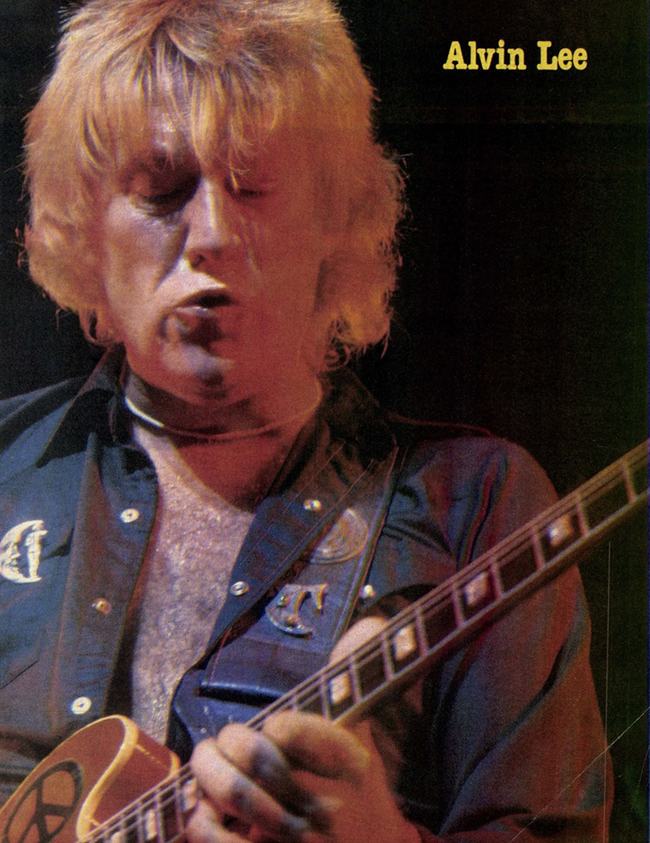
29 January 1983 -
Sportcsarnok, Budapest, published in Világ ifjúsága Magazine,
Hungary
|
January 1983 - Alvin Lee in
Yugoslavia
Photos: Zoran Trbovic
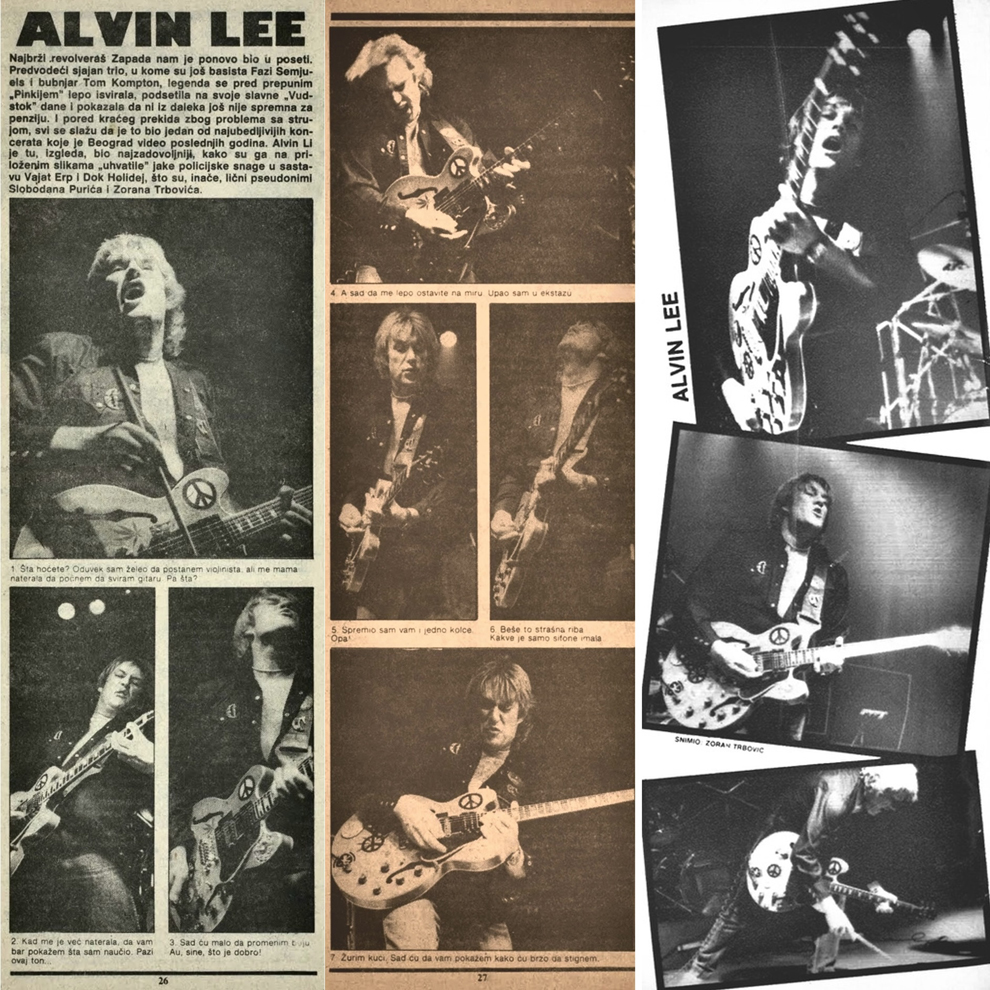
1983 - itd magazine,
Yugoslavia
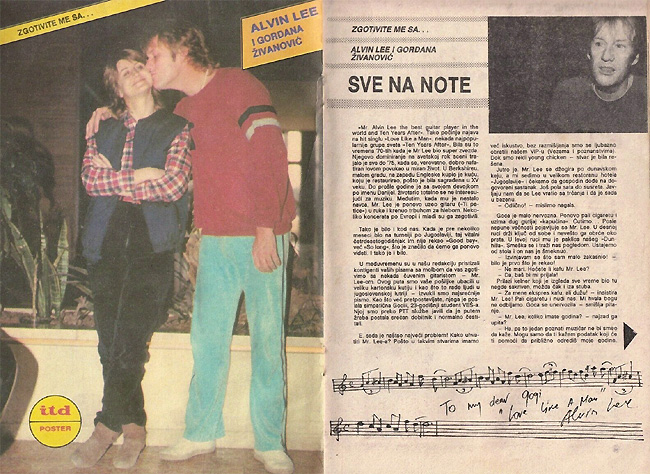
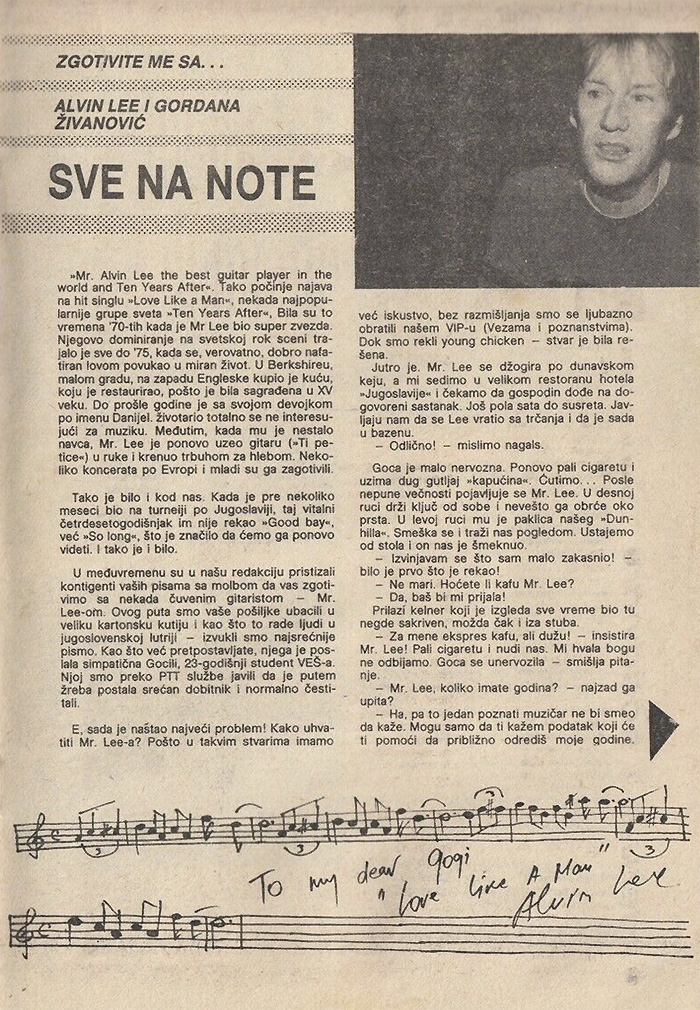
|
SOUNDS
GUITAR HEROES – SPECIAL EDITION
FEBRUARY - 1983 –
ALVIN LEE
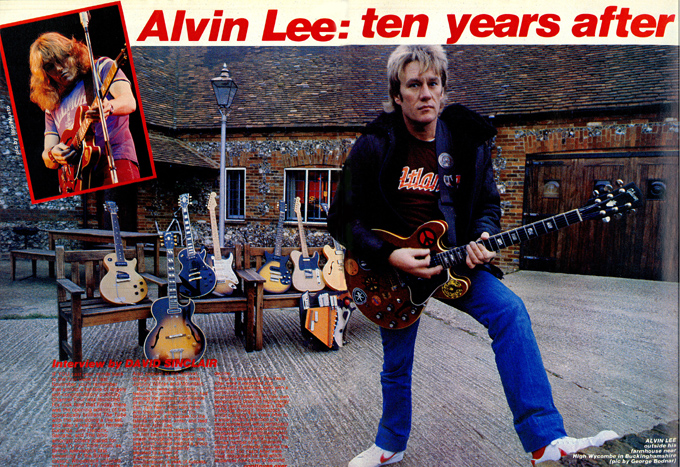
Interview
by David Sinclair
If
you cast your minds back to the first week of last
November you’ll remember that amidst a fanfare of
largely self-congratulatory publicity, Channel Four was
launched. For rock fans that Friday there was the
opening edition of the sporadically brilliant The Tube
with the Jam doing a live set, and later a real guitar
hero’s bonanza. Jimi Hendrix, Santana, and The Who
amongst others jostled for space
in your front room, as British television’s
first screening of the Sixties classic, Woodstock
unfurled on the nation’s T.V. screens.
Also
present at the festival, though not in the film, were
Johnny Winter and Leslie West Mountain. But there was
one guitarist featured for whom
Woodstock had perhaps
the greatest significance of all. For eleven
minutes in the film, Ten Years After held forth with
their epic version of “I’m Going Home” a showcase
for the talents of vocalist, writer, and guitarist Alvin
Lee.
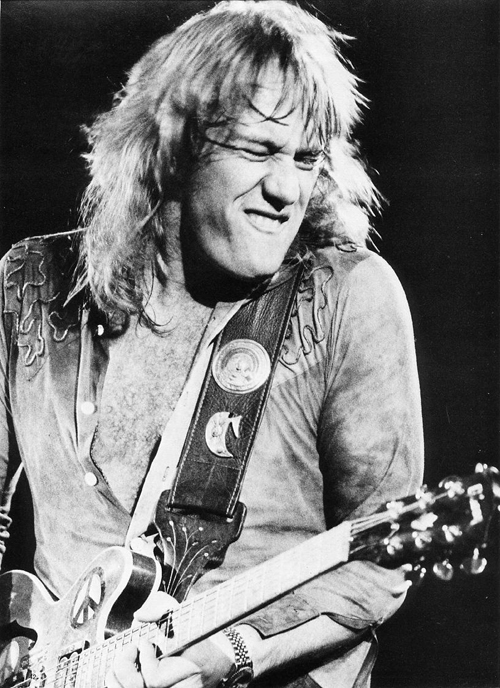
After
its general release in 1970, the film became a box
office smash throughout the world, and Alvin Lee found
himself leading a group that had become instantly
elevated to a level of superstardom. It was
simultaneously a peak of success, and the start of the
group’s decline.
Prior
to Woodstock, Ten Years After were a respected and
successful blues / rock band with a particularly
pleasing habit of occasionally dabbling in their own
personalized brand of high-energy swing jazz, such as
– Woody Herman’s “Woodchoppers Ball” and “I
May Be Wrong, But I Won’t Be Wrong Always”.
Woodstock, whilst bringing Ten Years After to a wider
public’s attention in a most spectacular way,
particularly Stateside, also disproportionately
emphasised one particular aspect of the band. “I’m
Going Home,” the climax number of an otherwise varied
set of material, became the style that Ten Years After
were most recognized for and which audiences now came to
demand. A twelve bar Rhythm and Blues shuffle / boogie
workout. “I’m Going Home” was notable for the
incredible velocity of Lee’s guitar playing. The
lyrics were throwaway to say the least, the keyboards
inaudible, drums and bass providing a monolithic thump
behind Alvin’s awesome Gibson guitar. Notes flew like
supersonic laser flashes as whole sequences passed in
the blink of an eye, and Alvin Lee stood there stage
centre, the quintessence of Rock and Roll cool.
His
features looked as if caved from granite, high
cheekbones, perfect skin, and sneering down-turned mouth,
all framed by a shock of thick blonde hair. He looked
like an ideal of Caucasian manhood, eminently photogenic
and totally confident in his mastery of his chosen craft,
but then, he’d had a fair old while to develop his
skill.
Alvin
Lee was born in Nottingham, England on December 19,
1944. His father Sam, owned an extensive collection of
blues records, and both his parents played the guitar.
So there was always an instrument laying around the
house. However, young Alvin’s first musical endeavours
were pursued on the clarinet, an instrument which his
brother-in-law- played.
After
a years lessons, Alvin swapped his clarinet for Broadway
Plectrum Guitar, and took chord lessons. His earliest
influences were the old jazz musicians, Django Reinhardt
and Benny Goodman’s guitarist Charlie Christian, but
it was Rock and Roll that was starting to percolate
through. “I was very into Chuck Berry and Scotty
Moore, who was Elvis’s guitar player,
and Jerry Lee Lewis, all straight rock and roll.
I still like it the best now. I did practice about four
hours a day, and when I was eighteen, I hocked myself up
to the eyeballs for my first electric guitar, it was a
Guy-a-tone with crystal pick-ups. Later on I got a Burns
Tri-Sonic which was awful, and then I got a Grimshaw,
which was
the nearest thing that I could afford to Chuck Berry’s
Blonde Gibson. I had that right up until the time that I
bought my Gibson ES-335 which I still use today.”
His
first group, featured the Guyatone guitar, was Alan
Upton and the Jailbreakers. Upton was a Jerry Lee Lewis
style pianist, and they played the local pubs on the
weekends. Then, in 1964 Alvin teamed up with bassist Leo
Lyons, and drummer Pete Evens, to form The JayBirds.
Pete Evens was later replaced by Dave Quickmire, and for
awhile The Jaybirds featured vocalist Farren Christy.
However Christy dropped out just prior to the group going
to play for six weeks at the Star Club in Hamburg,
Germany.
"The
singer dropped out and I just voluntarily became the
singer. I was underage at the time, and had to lie my
way in, but it was good experience for me. It was like
getting a years training crushed into a six week period.
Albert
Lee was there. Around the corner, playing at “The Top
Ten”. He could play the “Hound Dog” solo which had
always eluded me, so I introduced myself and got it
off”.
By
1967, Alvin Lee and Leo Lyons had teamed up with drummer
Ric Lee (who is no relation to Alvin Lee) – along with
keyboard player Chick Churchill, to form Ten Years
After.
The
group came riding in on the crest of the blues boom wave.
(Alvin was now in his element) “Thanks in part to my
father’s record collection, I suddenly found that I
had this great repertoire of blues songs, that
previously we could only perform at 3:00 in the morning,
when the clubs had emptied out”.
Decca,
in an unusual move, signed them to an albums only deal,
though singles were subsequently released, most notably
their 1970 hit from their album Cricklewood Green,
“Love
Like A Man”, which reached number ten in the British
charts. Their first album, self titled “Ten Years
After” caught the ear of American promoter, Bill
Graham, who booked them into his prestigious Fillmore
Auditoriums, and they quickly became a major concert
attraction in the States. Their albums from 1969 release
“Stonedhenge” were consistently strong sellers in
their native Britain.
“Underground”,
was a word that was bandied around at the time, and I
quite liked being “underground”. I had been through
the situation of wearing satin shirts and what have you,
doing a mini-Elvis Presley. And I realized that with the
kind of music we played, you don’t have to do that.
That was good, because it suited me to just turn up in
blue-jeans and a T-Shirt and not have to dress up and
have your hair done and things like that”.
Ten
Years After were an unpretentious but highly souped up
rock n´ roll unit. Although Leo Lyons, Chick Churchill
and Ric Lee were all admirably capable musicians, the
band’s principle appeal was in the dirty gritty voice
and high speed guitar of Alvin Lee. Emerging as
contemporaries of “Cream” (with Eric Clapton)
and “The Jimi Hendrix Experience”, Ten
Years After were cast firmly in that mould of 1960’s
groups that adhered to principles of technical
excellence and musical bravado and flash.
Alvin
Lee was in those days, an unnervingly fast guitarist,
and while he de-emphasises this important aspect now, he
was without peer in rock
guitar circles. Certainly for sheer speed, Eric
Clapton couldn’t have got near him, and it’s very
doubtful if even Jimi Hendrix could have matched Alvin
in this respect. Check: “I Woke Up This Morning”
from Ten Years After’s Ssssh album and see for
yourself, what I mean.
Alvin
says: “We used to sell a hell of a show (put on a hell
of a show). Ten Years After were specialist in blowing
people (other bands) off the stage, that was our ultimate goal – it wasn’t how
well we played, it was how well we went down, as long as
people went home, remembering that we played above all
else, then that was our motivation. Very unsubtle.”
Actually,
a lot of Alvin’s speed as a guitarist derived from his
background in jazz where ultra fast tempos are far more
commonplace than in rock, and the super-hyper- live
approach that Ten Years After utilized in their live
shows, energised themselves as well as their audiences.
According
to Alvin: “I never tried to be fast, it’s just that
when I got on stage, all the numbers sped up, then
suddenly the solo came and all of a sudden I’d think,
“Hell” I’m not going to be able to handle this,
but I’d just go for it…..”
But speed is not everything. The critical
backlash was not long in coming and particularly after
the Woodstock film was released. Alvin’s playing was
branded as “tasteless”, lacking in “finesse”
along with “excessive” – “self indulgent” and
“all haste and no taste” among other things. It
became a received wisdom that Alvin Lee, “the fastest
guitar in the west” couldn’t play subtly to save his
life. When in point of fact, Alvin Lee is one of the
most extremely versatile guitarist capable of playing
more styles of music, such as: Ragtime, through to
Classical and he was understandably and undoubtedly
affected by these snide criticisms as indicated by his
change musical direction subsequent to Ten Years After.
Woodstock
the movie was the watershed in the career of Ten Years
After – Alvin states: “It was a big break, but it
was the start of the end for the band too. Up till then
we had been playing eight to ten thousand seat venues.
After the Woodstock movie it changed drastically, almost
overnight to playing to 20,000 to 30,000 people every
night, and along with that, the quality of the gigs
dropped off as well. That’s when I’m positive that
the “Disenchantment” set in. Alvin continues:
“When a band is just starting out, in the early years,
all you really want to do is fill up your date sheet, to
keep working. Then, if and when the band finds some
success, you find that your date sheet is now full
everyday of the week. You work for maybe a year before
you come to the realization that you need some time off,
in order to write songs etc. and that’s exactly what
happened to Ten Years After.
Alvin
says: “ We just kept working and working and working,
then we had to fight just to get three weeks off and the
fun went right out of it. We didn’t feel that we were
achieving anything particularly, it was just what I came
to call “The Travelling Jukebox Syndrome”. This is
where you get on stage, plug in and away you go, and do
the same as you did the night before.
Ten
Years After did twenty eight American Tours alone. Each
one lasting about two months each, and in the end they
simply toured themselves out. Call it burn out or total
exhaustion, but that’s the fact. Their last official
album release as a band, came in 1974 with “Positive
Vibrations” and the vibrations were no where near
positive at this point. In fact, the band had already
split up long before this album was released –
although it was never officially announced in that way,
the band just stopped, and in an interview Alvin just
said, that
it was over, Ten Years After ceased to exist any longer.
Alvin
embarked on his solo career, in a direct attempt to
shake off some of the “No Subtlety” comments.
Alvin
continues: “ Some of the criticisms about me being all
flash and no taste affected me personally, but I was
pushing that side of it for a long while, and then I
started to back off a bit and I went through that whole
psychological thing of thinking, “I must do something
more tasteful just to prove it”. But overall it
didn’t do me much good in the long run, all it did was
confuse the audiences.
Thus
a collaboration with Mylon Le-Fevre
began that yielded an album called: “On
The Road To Freedom” released in 1973, which
established a more tasteful tone, that continued on
through three albums during this period. For live work,
Alvin formed a nine piece touring band: “I did a very
tasty set, that worked out very nice in clubs, but put
that into big arenas and it was frustrating to me,
because halfway through the set, and although I’d gone
off doing the unsubtle stuff, I suddenly felt that the
audience was wanting some real grating rock n´ roll.
But the way that the band and the equipment were set up,
we really couldn’t deliver grating rock. I was going
through the fifteen watt WEM only, miked up and coming
through the monitors – it’s a totally different feel
to having four cabinets behind you.”
Alvin
was grapping with the problem that faced all of the
sixties guitar-axe heroes: how to move forward into the
seventies without disappointing audiences who know you
for one particular body of work, that’s rooted in the
sixties. “Through that period I came back to my roots,
one of the reasons for that was because I went to see
Jerry Lee Lewis in Birmingham, and at the time he was
playing only country songs, I came out of that concert
feeling really disappointed, because he didn’t do
“Whole Lotta Shakin´” and “Great Balls Of Fire”,
and it occurred to me that if people come to see me, and
I don’t do “I’m Going Home” and “Good Morning
Little Schoolgirl” then maybe they would feel that way
too”.
The
combination of this thinking and pressure from R.S.O.
records with whom he got a record deal in the States,
led to the new formation of “Ten Years Later”.
Comprising of : Tom Compton on drums, Mick Hawksworth on
bass guitar, and Bernie Clarke on keyboards, they cut
two albums: “Rocket Fuel” 1978 and “Ride On” in
1979. It was the start of a frustrating period for Alvin
Lee, where the output had been dictated more by the
record company demands, then by his own artistic
requirements.
“Ten
Years Later was actually a joke name, it didn’t last
very long. I thought that “Rocket Fuel” was quite
good, and I thought “Ride On” wasn’t. That’s my
personal opinion. There’s not many people that agree
with what I think, even the people who follow it closely.
R.S.O.
specifically
wanted a rock band. They particularly
wanted us to play heavy rock, and so we moved
towards that, but it didn’t happen the way they wanted
it to, and we weren’t
enjoying it that much”.
Since
then, he has released two more solo albums, teamed up
for six months with Mick Taylor with whom he toured in
Europe and
the States, and is currently working on material for a
new album. He’s down to a three piece “Alvin Lee
Band” for touring, comprising of:
Fuzzy
Samuels on bass and Tom Compton on drums, both of whom
are featured on his most recent album release, “RX5. I
talked to him in a sumptuously well appointed flat
located near Holland Park.
Thirteen
years after Woodstock, and approaching his 38th birthday,
his face is lined, and he has put on weight, he remains
courteous and dignified master guitarist.
What’s
your view in 1982 about that Woodstock appearance?
“Actually I saw it only the other day on Channel 4 and
to be quite honest, I was getting really worried before
my bit came up, because I was thinking, “now I’m
going to watch this and I’m going to think, where have
I gone since then?” musically. Often in moments of
doubt, and everyone has moments of doubt, I used to
think, “I’ve done my best gig somewhere in Cleveland
or, I don’t know when it was, but I probably played as
best I’ll ever play”. And I was quite relieved
afterwards, because actually I didn’t play that
well!!! The energy was good, but I did a few horrible
things that I’d never do now. In fact, I’ve improved
quite considerably, so I didn’t feel as bad as I
thought I would.”
Do you think that your best gig’s still ahead
of you? “Hopefully, hopefully”. I always thought
that Ten Years After, had a bit of a problem, getting
that energy across on record sometimes.
“Yeah
– we never cracked that, we never got the energy in
the studio that we got live. To me there’s a whole
different attitude to playing live, as opposed to
playing in the recording studio.
Even
when we’re recording live, I don’t think about the
recording. I play the gig, I play to the people. I show
off a bit, I go for things that I might not get, on the
off chance that I might get them, and often when
you’re that confident you do get them.
“That’s
where the new licks come from, those bravado tries, and
in the studio I kind of go safe. You start constructing
the number and it gets more subtle, and I think what Ten
Years After had live was very unsubtle, and no matter
how we tried in the studio, we just couldn’t get it to
have that rawness. Of course a lot of it is more than
sound at a gig, a lot of it is the environment – the
feedback that you get from the audience. If you do
something a bit outrageous and the audience loves it, it
encourages you to be more outrageous. “There’s no
such encouragement like that happening in the studio.
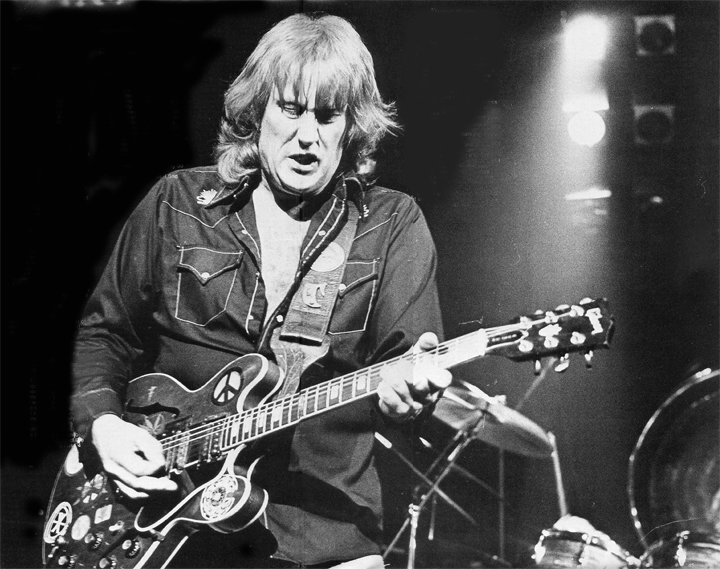
Pic by Barry Plummer
How
much were you influenced by Eric Clapton and Jimi
Hendrix?
“Well
I wasn’t terribly influenced as far as what I actually
played, but what did influence me was the effects of the
way Hendrix played, and the area in which they played,
gave me a good idea as to what I could get away with. I
never tried to play like them, but I could play in that
vein, with no problem.
Jimi
Hendrix to me personally, was an innovator. When I first
heard him I didn’t know where he’s come from; the
closest that I could figure, was like a psychedelic
version of John Lee Hooker. After hearing Hendrix and
getting into him, then I’d suddenly go into an extra
long, sustained distortion bit, and really his music
gave me the idea and the freedom to do that. I’d
probably have not done that before I heard him.
Eric
Clapton:
I
think that I borrowed his vibrato technique; I used to
vibrato very fast, and Eric used to do it so much slower,
and I used to think “now, how can he do a really hot
lick and then go right into that vibrato at the end of
it ? But I liked it. With Eric, it’s easy to see his
roots, you could look into all the Kings – Freddy King
– Albert King and B.B.King and the old bluesers and
things and I knew lot of it anyway.
“I
think you take a bit from everybody you hear. It all
mucks in – into one thing; sometimes I hear a
guitarist that nobody’s ever heard of, then or since,
and you can learn something off of them too. Everybody
who picks up a guitar plays something different, usually
the first thing you do, you just fiddle around, just to
get the feel of the instrument. Those fiddles are often
the basis of their style patterns. Not reading music you
see, I work in patterns and a new pattern, is a good
thing to fall across. I find fewer and fewer the more I
play. They get less and less. There are still hundreds.”
What
advice would you give to an aspiring young guitarist,
who is very anxious to achieve your kind of speed ?
“Well
the speed just came from all that energy. I mean I’m
not really that fast, a guitarist Jazzers play much
faster than me, but they ply smoothly, so it just
doesn’t come across as fast. My so called fast runs
are very staccato and they come out like jarring machine
gun bullets, whereas a jazzer will use a smooth bloopey
sound. I hit every note with attack, and I play with a
lot of aggression: I think it’s more that than speed.
I’ve found the way to practice is when you get new
lines and new licks is to work them really slow and
repeat them over and over again. If you can do three or
four hours a day of that they get faster without you
even realizing it”.
Do
you still use the same Gibson ES-335 with all the
stickers on it ? (Known Affectionately As “Big Red”)
Yeah,
I bought it for 45 pounds actually, in Nottingham, with
case. It was quite a good investment. It’s had a new
neck. I broke the neck at the Marquee. It’s very small
headroom there, and I got carried away with the old
guitar, and chopped the top off. I had to send it away
to Gibson, they kept the old head with the serial number
on it, and spliced a new neck on it. They also
re-sprayed right over the body, and I had all the
stickers on, which is why they’re
still there today. They’re kind of cellulosed
over. It’s a dotted neck. “I’ve got an additional
Fender pick up on which I mainly use in the studio, and
those TP-6 turnable
tailpieces – I like those, they’re great, you
don’t have to take your hand off to tune up. Apart
from that, it’s a pretty regular one. It’s a bit of
a good one.. I think it’s a 1958 model actually.
Now
do you have the action set on it ?
“Pretty
high and hard. The original teacher that
I had did a lot of Django tape stuff, so I got
hard finger pads pretty early. I use a 54 on the bass
end. because I like to hit open E’s a lot and if you
have them much lighter than that, I find they ring sharp
at first, so I have a very heavy bottom and a
comparatively light on the top. For example: From the
bottom up it’s – 54. – 44. – 28.- 15.- 12. and
9.
And
Guitar Pick ?
“I
use three cornered ones. I got about 12 gross of them in
New York one time. With the side scrubbing I wear them
out quite a bit. With the side scrubbing technique, I
can turn it around and get three times the use, a very
hard pick.
What
amplification do you use ?
“I’ve
got a Marshall 50, an old one, a small flashy one and
I’ve got four outputs on it and I use four cabinets.
I’ve always used that, it’s great. I’ve found that
the 100 is just a bit to middley. While the 220’s are
totally useless: One time I had the guys from Marshall
come down, I really wanted to find out exactly why my 50
was so much better than the brand new Marshall 50’s.
– and they said, it shouldn’t be any different, and
they got out the old dentist’s mirror, they looked in
the back, and the guy said, “Oh, this must be an old
one, because they didn’t have these when I’ve been
working here”. He’d found a component. I said,
“Whatever it is, stick it on all of them”, and it
seemed to do the trick actually.
“Also
I power the valves a lot. Hell of a lot of bias on the
valves, so I change the valves once a week on the road;
but that gives you that high sustain. In the studio
I’ve got a 15 watt WEM with one Celestion which sounds
just like a stack of Marshalls milked up, they’re
actually a bit better for
recording”.
What
sort of volume setting do you put that on ?
“Three
quarters to full, I find that the Marshall 50 watts
practically flat out, that’s the best sound. If you
turn it down, it gets a bit dry”.
Do
you have any pedals or use any other effects ?
“No,
I always avoid those. I like a strong lead, that also
gives me the level I need. I sometimes use effects in
the studio, but I don’t put them between the guitar
and the amplifier: I put them after. I do like reading
about all these effects boxes. Makes me laugh; I’m so
glad I don’t have any. How on earth musicians choose
nowadays. You open those books and there’s 80 guitars
and 300 foot pedals to choose from. It was Gibson or
Fender when I started, it was quite easy to choose, if
you could afford it”.
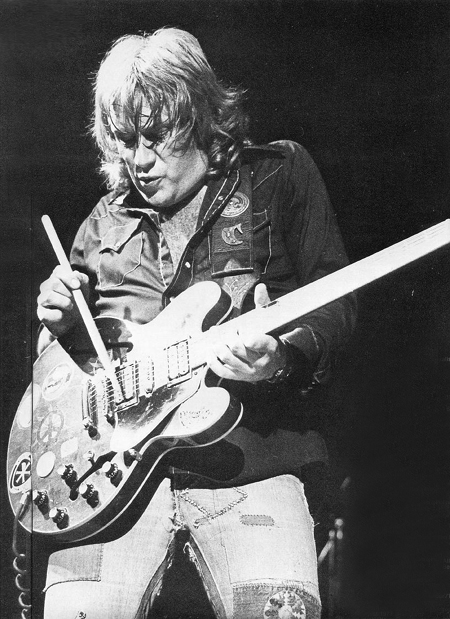
What
Acoustic guitars do you have in your collection ?
"I’ve
got a Martin and a Yamaha, not the most expensive
Yamaha, but it’s got a turn-able bridge so I can use a
wire third if I want. My favourite one is the cheapest
Yamaha in their price range, with gut strings on it.
That’s
the one I pick up and fiddle with all the while”.
Do
you use any unusual tuning at all ?
“No,
very seldom do. I just mess around with them, but I
don’t actually use them. I play bottle-neck in
standard tuning. I’m not a great bottle-neck player”.
What
do you use for a bottle-neck ?
“A
torque wrench thing off of a plug spanner. A very heavy
one. It’s Lowell George’s idea. I got it from him."
Are
you a guitar collector ?
“Semi,
semi. What I do is, if I do a tour of America, I get a
guitar when I get there and use it at the hotel and then
it enters the collection. I’ve got about 40 guitars. I
usually buy novel guitars. I’ve got three favourite
guitars which I keep strung: the rest tend to get stuck
into boxes and end up with rusty strings. I think
you’re well
if you can keep three guitars in good playing
condition”.
It’s
very often overlooked, that as well as being a guitarist,
you’re also a singer.
“Well,
I often overlook it too actually. I don’t really think
about it much, I’m more of a shouter than a singer. I
don’t profess to have much of a voice, but I think
half of it is the effect of singing and playing the
guitar. “With my Chuck Berry upbringing, you phrase
differently, you phrase a vocal lick and then you answer
it with a guitar lick.
I think that’s a quite natural sounding way
of doing it. I also do the odd session, with
people where I put a guitar solo on, and I usually play
all over the vocals, if I’m not singing it. I try to
make the vocals as good as possible, but I’m no Paul
Rogers, and I never will be."
What’s
your view of these bands like “The Who” and “The
Rolling Stones” who are still pressing on after all
these years ?
“Well,
I think it’s nice for us, the listeners as it were:
there was a lot of pressure for me to keep Ten Years
After together from the business side of things, but I
knew that it wouldn’t work.. I could feel from the
other guys, that there was no pulling in one direction,
and the managers wanted me to, if I wanted to change,
they wanted me to keep the Ten Years After name.
Business wise, and looking back, that would have been
good for me to do for the money, but not for the others
in the band. For me it just didn’t seem right. Ten
Years After was the four of us, and if I was going to
change the musicians, I’d call it something else."
How
democratic or otherwise was Ten Years After ?
“It
was very democratic. It was an equal band all the way
down the line, and with any democratic band like that,
because I was the lead guitar, and singer, I got more
spotlight, I got to do more interviews which I really
didn’t want to do actually. I was keen to spread the
load, but with that also came a little bit of bad taste
from the other boys in the band, which caused a little
bit of friction”.
You
also wrote and handled most of the production !
“Yeah,
right, and people used to say to me – You’re Ten
Years After; and I’d say, “I’m not”. I didn’t
really want to be. I didn’t want to take all the blame
to be honest”.
What
are the other guys doing now ?
“Leo
Lyons is producing, he’s got a studio in Oxfordshire,
and he’s doing pretty good. Good producer actually. He
did some time at Wessex studios; he knows his onions
(Business). I’m still in touch with Leo, I go down and
play him my tunes and things. Ric Lee was playing in
Stan Webb’s Chicken Shack, but he’s doing managing
now; I think that’s taken over from his playing more.
Chick Churchill, is not in the music business anymore
unfortunately. I don’t know if that’s terminal or
not. He’s got into music publishing a bit”.
Can
we talk a bit about your recent activities; since Ten
Years Later you’ve been working solo.
“Ever
since 1979-1980 I’ve found myself up until last
Christmas being pressured into making albums all the
while, when I haven’t really got enough fresh ideas
and that’s a trap. As much as I’d like to think of
myself as a musician above being a rock star or whatever
you’d like to call it, when people are waving money in
front of your nose and they want an album, you tend to
get it done whether you think you’re ready or not.
“I’ve been doing that and the last two albums I did.
I didn’t even have enough songs to dare start. I got
three songs for the last album – called RX5, and I
only thought two of them were any good anyway, so it’s
just a matter of getting enough tracks down to make an
album”. Isn’t that a rather cynical way of doing it
?
“Oh
it’s terrible.
It’s
just the way things were, where I was at the time and
everything else, but I have stopped it now. I realize if
I’m going to keep on making albums that I can’t
even------I mean people used to ask me about RX5 – and
I used to say, “I hate it, all of it. It’s
ridiculous you know, because people who buy albums or
even get them free, when they hear that, to them
that’s everything I stand for and do at the time, and
it’s too important just to go bumming them out.
So
for the next nine months I’ve been writing pretty
solid. I’ve got a target not a deadline to start
recording in February. But I’m certainly not going to
release anything or let anything out until I’m really
happy with it. I can’t hope for an album to be
successful if I don’t like it, and if it was it would
be silly, because I’d have to make another one like it
then.
“So,
I’ve been delving back into my roots and writing new
stuff, old stuff…..and just a lot of writing. Playing
more for my own pleasure, more than I’ve done in
awhile”.
Alvin,
I noticed at a previous meeting, where liberal supplies
of alcohol were available, that you were very careful
not to drink….any reason for this ?
“I
never used to drink, and then I did start for awhile,
and like most things, I went over the top for awhile,
and then I just cut it out altogether. It didn’t
really suit me, being an old hippie. I’ve never been a
serious drinker, but I did start getting into playing
poker with a bottle of scotch, that was with Steve Gould
and Mickey Feat actually, not putting them down,
they’re wonderful guys. I didn’t have to join in”.
“I’ve
put on a lot of weight as well, and it was just
generally no good for my health. I had a good clean
out….I was going down the old Elvis road at one time,
getting very puffy and doing lots of other things that I
shouldn’t have been doing. But fortunately, I saw the
light, and I saw myself before it was too late”.
Do
you have a recording contract at the present time Alvin
?
“No,
as a matter of fact I don’t at the moment. I’m
looking for a new one right at this very moment, but I
do have an option with Atlantic in the States, they’ve
got first choice as it were”.
Are
you going to do any gigs in Britain ?
“I
haven’t done any for a long while. I don’t do much
in England. Ten Years After never did that much in
England, and the last time I tried it, there was very
poor attendance anyway. So that has kind of put me off
trying, although I’d love to. I wouldn’t mind
playing the Marquee again actually, just to see if
it’s anything like it used to be. “I’ve played the
Odeon. Hammersmith a couple of times, a token English
gig, but there seems more interest abroad.
Possibly
because when Ten Years After were kind of hitting it, I
preferred not to. Well the whole band preferred to kind
of keep a low profile in England, because we lived there,
you know what I mean ? It’s great going over and being
a rock star in America, but when you get home it’s
also as nice to be able to walk the streets without
having any problems. The main reason really why I’ve
always been a musician
is that I can’t do anything else. I don’t
have a proper trade you see”.
It’s
certainly been a reasonable trade so far hasn’t it
Alvin ?
“Yes,
but my attitude has always been that a musician’s only
security is that you can sing for your supper. If you
can make ten pounds down at the local pub, then you can
eat. That’s really all you can count on, you can’t
count on thousands of pounds and being successful. A lot
of that’s fashion, waves of fashion. You can catch a
wave and then lose a wave, and then you have to go back
and catch another one.
The
working for your supper theory keeps you more level
headed. I’m certainly not afraid to get up at the
“Red Lion” and do a bit – quite enjoyable
sometimes, things like that. You lose the tension; put
your beer on the amplifier, and turn your back to the
audience occasionally – it does a musician a world of
good to not have to take his profession so seriously.
“But
there again, even when I get up and jam, I like to
deliver something; I wouldn’t like to get up and jam
on a bad guitar, that I can’t play because I
……….somebody’s going to remember it. You’ve
got to deliver something – and make people think about
it when they go home”.
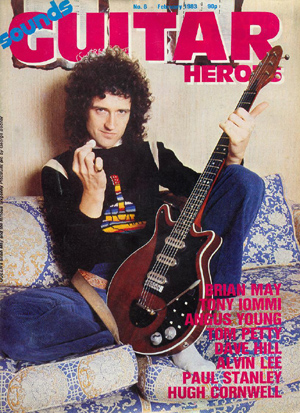
|